Companies are far more than numbers on a balance sheet, a stock price, or the subject of a long-range business forecast. They are people. Since the war started, it is due to the people of Teva that the company continued to steadily supply medicine and medical equipment to meet the demand that has tripled while also expanding its donations and volunteering activities.
When Hamas attacked Israel’s south on October 7, everyone in Israel, including the employees of Teva Pharmaceutical Industries family, was affected. The father of a Teva executive was shot in his home in Kibbutz Alumim; the parents and family members of a Teva information systems specialist were kidnapped; and the CEO of SLE, Teva’s logistics company in Israel, was called to his IDF reserve unit seven weeks ago and has been on active duty since.
Here are their stories.
“My father recovered, but my family was completely uprooted.”
On Saturday morning, October 7, the sirens in Netanya did not frighten Ofri Meller-Peri, Teva Israel’s Director of the OTC Unit. But when her cellphone rang that Saturday afternoon and her Sabbath-observant brother-in-law’s name appeared on her caller ID, she realized something terrible had happened.
“When the shelling started early in the morning,” recalls Meller-Peri, a “Qassam rocket fell behind my parents’ home in Kibbutz Alumim. Shrapnel shattered their bedroom window. My parents were in their bomb shelter and knew that terrorists had infiltrated the kibbutz.” The kibbutz security squad fiercely defended the kibbutz against waves of terrorist incursions. While most of the security squad was defending the area near the main gate, terrorists on motorcycles infiltrated the residences of the kibbutz’s foreign workers. Tragically, 19 Thai and Nepalese workers were murdered, four were kidnapped, and others were seriously injured. After hours of intense combat, the security squad overpowered the terrorists and succeeded in protecting the kibbutz residents and their homes.
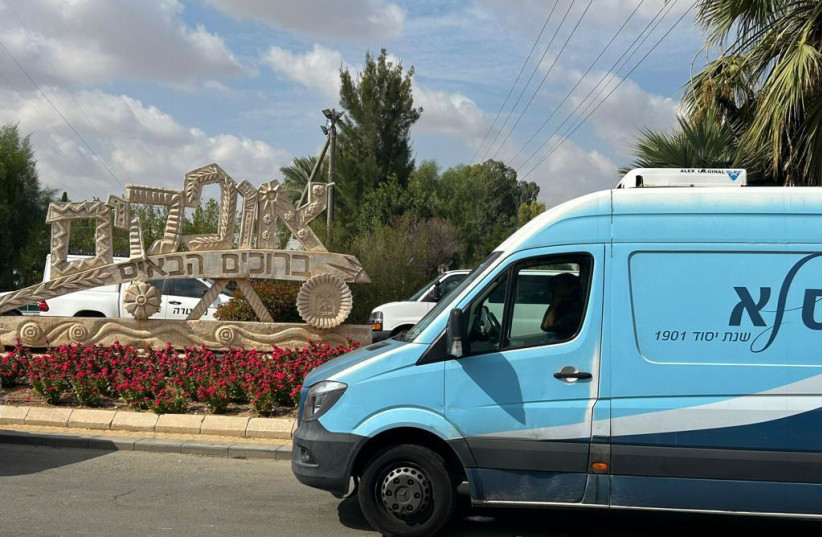
“Around 1:00 PM,” continues Meller-Peri, “my parents heard glass shattering, and my father, Benny Meller, decided to leave the bomb shelter to see what was happening. When he came out of the shelter, a terrorist who had broken into the house shot him three times. One bullet struck my father in the stomach and exited through his chest. The other two bullets missed him. The terrorist then ran outside. My father returned to the shelter. My mother informed the kibbutz command center and a rescue unit was dispatched. By then, IDF soldiers had arrived. The soldiers killed two terrorists there, including the one who shot my father. Unfortunately, the team commander, Captain Itai Cohen from Rehovot, was killed.” Meller-Peri’s father was evacuated to Soroka Medical Center.
“After my father’s evacuation,” she continues, “my mother updated my siblings on the kibbutz. My religious brother-in-law, who is a psychologist, called me that Saturday at 1:45 PM, and when I saw the call from him, I immediately realized that something had transpired. I was the only person who could drive to my father, but I didn’t know where to go. Since everything was chaotic and my father was not allowed an escort, it wasn’t clear where he was evacuated. I had to search for him with the help of my friends from Teva.
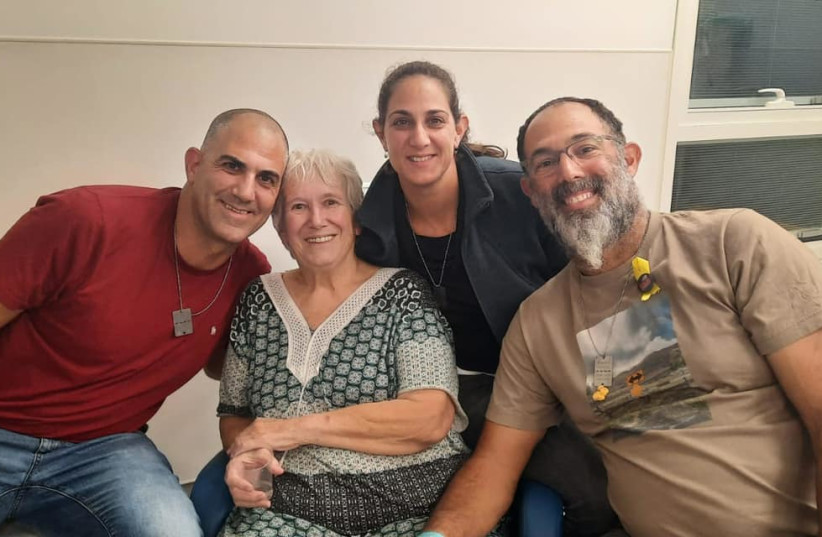
“A member of the Alumim security squad, who was injured and was evacuated along with my father, contacted me and informed me where he was. As I drove to Soroka, sirens blared, and I had to stop numerous times to take shelter before reaching the hospital.
“They took my father into surgery, and he remained hospitalized for another nine days until he was discharged and joined his family in Netanya. “Despite his age, he is strong and very active,” she says. “A senior officer from a paratrooper commando unit who was hospitalized alongside him professed that my father’s strength and optimism inspired him.”
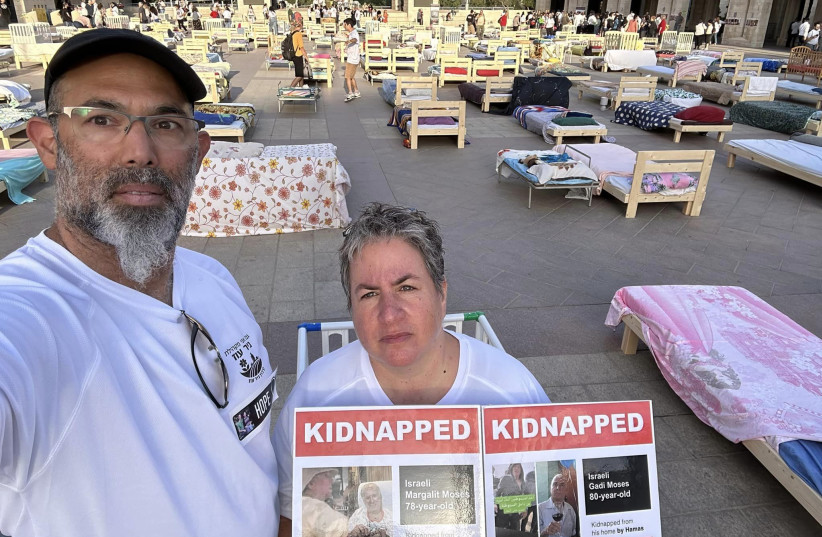
Ofri’s extended family is staying in two hotels in Netanya with the entire Kibbutz Alumim community. Her family from the kibbutz includes her parents, her sister, and her four children, who are staying in one hotel, and her two brothers’ families, who are in another hotel.
Kibbutz Alumim, a religious kibbutz of 90 families and 550 residents, was minimally damaged. Donations came in from throughout the country, including the donation of dozens of Teva laptops, which Teva gave to children and families in a moving get-together with the brave people of Alumim, facilitated by the nonprofit Mitchashvim (whose name means both ʹthoughtfulʹ and ʹto computerize’).
“This story has not ended, because there are so many more people who have been abducted by Hamas, and also because my family has been uprooted from their lives,” says Ofri. “The kibbutz communities surrounding Alumim were severely damaged, and returning to the area requires that the security situation enables people to live there. It will take time. This makes current day-to-day living a difficult intermediate situation, even for strong people like the residents of Alumim. On a personal note, I want to thank Teva for their love, support, and understanding, which enabled me to report for my reserve duty and support our national effort and challenges.”
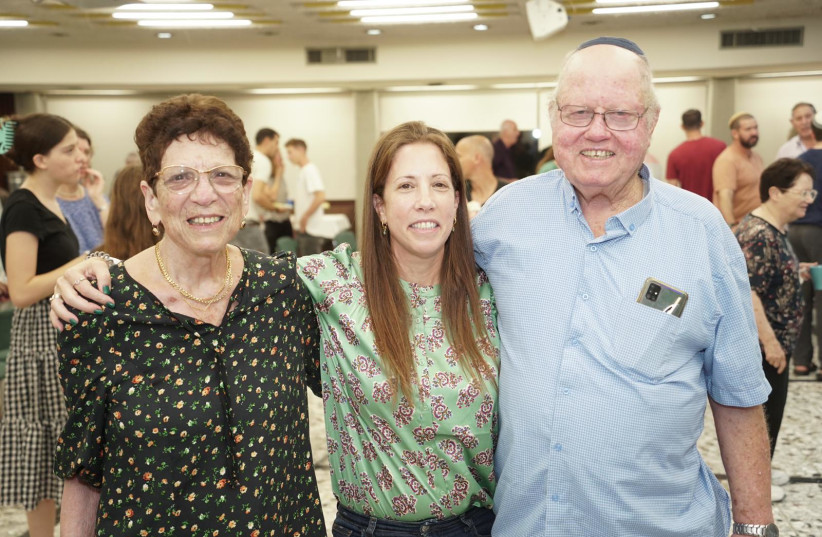
The Abductions
When Yair Moses was growing up in Kibbutz Nir Oz, there were no serious security problems, no security fence, and the houses did not have bomb shelters. Today, he lives in Gedera, is married, and is the father of three. He has worked in information systems at Teva for 17 years. His mother Margalit, and his father Gadi Moses, were abducted. His father’s partner, Efrat Katz, was murdered. Efrat’s daughter, Doron Katz-Asher, and her two young daughters, Raz and Aviv, were also abducted by Hamas.
On October 7, Yair Moses awakened to the sound of sirens. Moses called his parents in Kibbutz Nir Oz. They informed Yair that they were in their own bomb shelters (they are divorced). Doron Katz-Asher and her two daughters were staying with Gadi and Efrat.
“In retrospect,” says Yair, “I think my father already knew about the terrorist invasion of the kibbutz and did not want to alarm us, but my mother didn’t know anything. When we started to understand what was happening, I tried to reach them again, but they were no longer available.”
On Friday, November 24, Margalit Moses, Doron Katz Asher, and her two daughters were released. Margalit returned to her family and community, who are temporarily residing in Eilat until they can return to their beloved kibbutz.
“Kibbutz Nir Oz is in a dire situation,” says Yair. “I visited the kibbutz three weeks after the massacre with a camera crew to make a video for Teva. Seeing the destruction and smelling the burnt odor was distressing. This attack has devastated the community. I am currently devoting myself to the fight to return the hostages, and my team and Teva are giving me all the backing and support I need, including explicit instructions not to think about work.”
“Sometimes, I break down when I get support,” says Yair. “In the first week, Richard Francis, Teva’s President and Chief Executive Officer, called and spoke with me. He was so sensitive that I choked up with tears at the end of the call. The support is coming from many directions, and these are the moments when I break down because these moments are so beautiful.”
An Officer and a CEO
On October 7, amid Hamas missile barrages, Hadar Mama packed his gear and made his way south to serve in Israel’s military reserves. Since then, he has been fighting in the Gaza Strip but still has his finger on the pulse of SLE, the logistics arm of Teva in Israel, which he heads as its CEO, and which is responsible for supplying pharmaceuticals throughout Israel.
While Hamas missile attacks continued overhead, Mama used his travel time to speak with Yossi Ofek, CEO of Teva Israel, and with his management team to explain the situation. He began to delegate responsibility and authority during his absence.
Currently, Hadar moves between three command posts: his family, which remained at home under the threat of missile attack, SLE, and his army position. “In Gaza, we don’t have cellphones, so whenever I leave and head to the brigade base or home, my travel time is consumed with phone calls, status discussions, and decision-making. I need to be in touch with my team, but I know that we’ve built the best, strongest, and most robust executive team for the company.”
Between fighting in Gaza and resting on the base, Hadar finds time for virtual meetings with his management team, receives status updates, and makes key decisions. “In the beginning, the situation was chaotic,” recalls Mama. “The tragedy of the home front was always front and center, and within that reality, some terrorists were still in the area. The things we saw were horrific – corpses, destroyed houses, and burned-out cars on the sides of the road.”
In the first four weeks of the war, SLE had to deal with high demand because hospitals, health maintenance organizations (HMOs), and civilians needed supplies and equipment. SLE employees functioned well and delivered pharmaceuticals to all locations in the country, even under missile fire. In those first days, Mama had no time for work calls but communicated on WhatsApp whenever possible. “Turning on my phone every time I took a break and finding messages from SLE was a source of pleasure, even if I didn’t have time to get back to everyone,” he says.
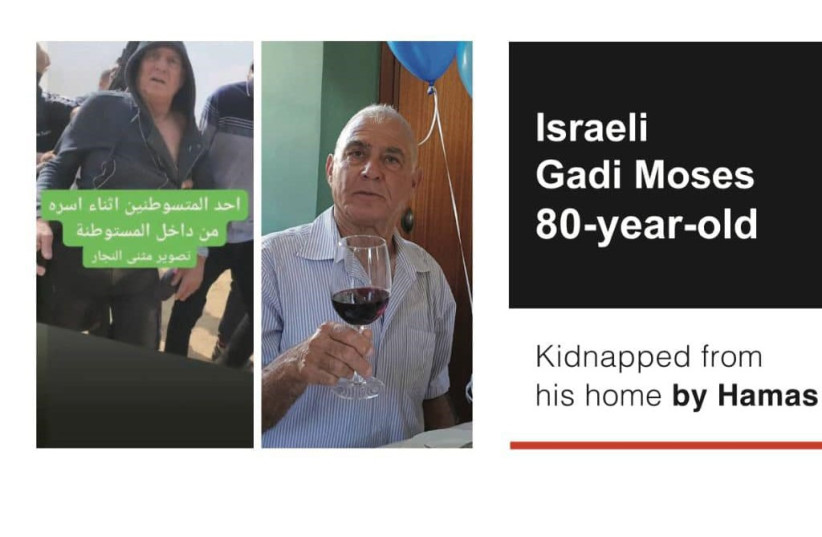
“Regarding the embrace I received from Teva, the support, the concern, and the help – I have no words to express my appreciation to everyone. I’m eager to return to work, but now, I’m needed here. This is the national mission, and we’re all engaged in this mission. Our SLE drivers wear helmets and bulletproof vests to distribute pharmaceuticals and get where they need to go. Our brigade also received deliveries of equipment collected by Teva workers for us, and pizzas for everyone – it is unbelievable. The people of Teva and SLE, and the people who fight alongside, are the confirmation and the reason that we will be victorious!”
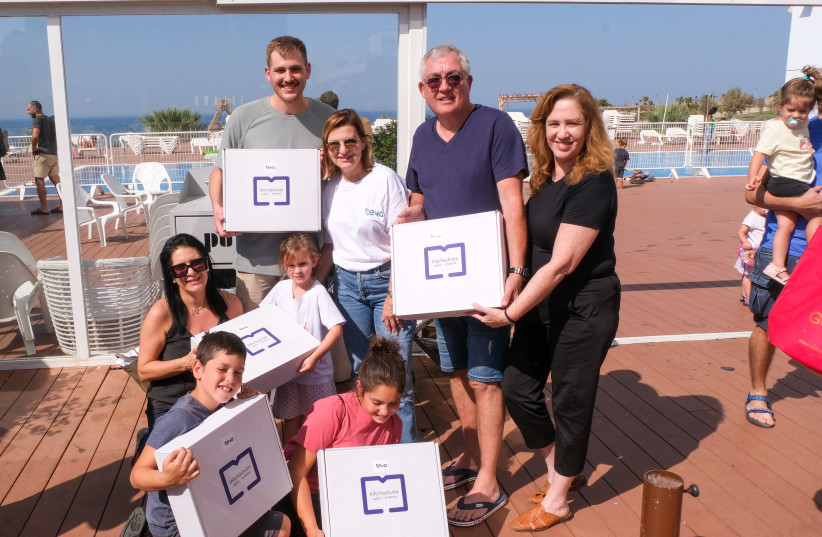
This article was written in cooperation with Teva
